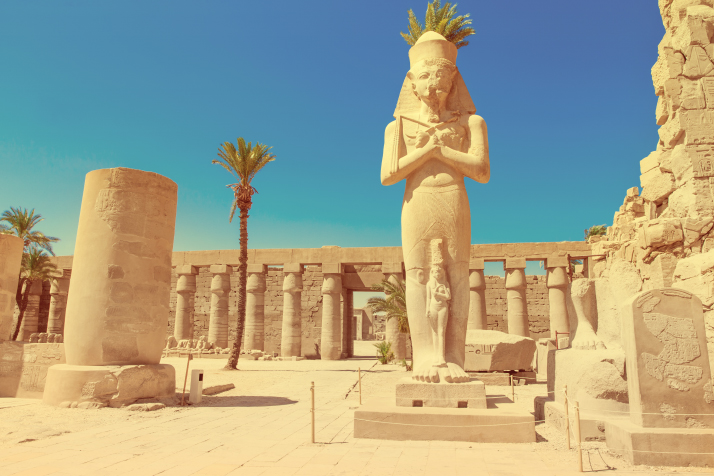|
||||||||||
| Home Nation World Business Opinion Lifestyle ChinAfrica Multimedia Columnists Documents Special Reports |
|
||||||||||
| Home Nation World Business Opinion Lifestyle ChinAfrica Multimedia Columnists Documents Special Reports |
| ChinAfrica |
| Preserving Legacy |
| The UNESCO-Africa-China Forum adopts action plan on heritage protection |
| By Christophe Alexandre | VOL.11 August ·2019-08-22 |

China has cooperated with Egypt in archaeological excavations and research in the Karnak Temple area (HELLORF)
In today's interconnected world, it is clear that culture has the power to transform the societies. Its various manifestations - ranging from precious historical
monuments and museums to traditional practices and forms of contemporary art - enrich every aspect of people's daily lives in countless ways. Heritage is a source of identity and cohesion for communities disrupted by accelerating change and economic instability. Heritage also helps build dynamic, innovative and prosperous knowledge societies.
From the Great Wall to the majestic Victoria Falls, China and Africa are collaborating to safeguard their heritage.
Joint efforts
At the UNESCO-Africa-China Forum on World Heritage Capacity Building and Cooperation held in Paris on June 3-4, 150 participants, including ministers and heritage experts from China, Africa and Europe, held discussions on the theme of World Heritage and Sustainable Development: Sharing Experiences From Africa and China.
The main aim of the forum was to establish an inclusive and sustainable platform for engagement between China and Africa. "World heritage sites ... play an important role in protecting biological and cultural diversity, catalyzing exchanges between civilizations and promoting mutual learning and sustainable development," noted Shen Yang, Ambassador and Permanent Delegate of China to UNESCO, during the forum.
The forum was based on the mutual priorities of China and Africa, set out in two major documents, the United Nations 2030 Agenda for Sustainable Development and the African Union Agenda 2063: The Africa We Want. Both documents commit to shared peace and prosperity at the local and global levels for safeguarding cultural and natural heritage. Experts believe that the forum was an important step in implementing the commitments of China and African countries for capacity building as endorsed at the Beijing Summit of the Forum on China-Africa Cooperation held in September 2018.
"The friendship between China and Africa has a long history and has deepened with the frequent interactions in the cultural field in recent years," said Song Xinchao, Deputy Director of the National Cultural Heritage Administration of China. According to him, China has signed intergovernmental cooperation agreements and implementation plans with 52 African countries, as well as agreements with Ethiopia, Egypt and Nigeria to combat illegal entry and exit of cultural relics. China has cooperated with Africa in archaeological excavations and research in the Karnak Temple area of Egypt and the Lamu Islands in Kenya. It is also sponsoring the training of African professionals by providing government scholarships.

Migratory Bird Sanctuaries Along the Coast of Yellow Sea-Bohai Gulf is included in the World Heritage List on July 5 (JI CHUNPENG)
An alarming finding
To date, a total of 148 sites (including 14 trans-boundary sites) in 39 African countries are included in the World Heritage List. Yet, African sites represent one-third of the List of World Heritage in Danger. "The low proportion of African heritage sites on the World Heritage List is highly disproportionate to the rich cultural and natural heritage resources of the vast African continent," asserted Song, adding that the high proportion of African heritage at risk indicates that the protection of Africa's heritage faces extremely serious challenges.
As such, one of the major challenges for this forum was to enlist, within the general framework of China-Africa cooperation, strategic issues, African cultural issues in particular, relating to the eligibility of African sites in the cumbersome procedures of their validation by UNESCO and the consideration of the needs of African states in terms of training of qualified personnel of various governments.
China has 55 properties inscribed on the World Heritage List and none of them is on the List of World Heritage in Danger.
African and Chinese assets together represent sanctuaries for much of the world's biodiversity. The discussions at the forum, therefore, enabled the establishment of joint exchange programs, pilot projects and joint research between China and Africa.
Both China and Africa have a long history and magnificent culture. Many cultural heritage sites are linked to the origin of human civilization and its development. Unfortunately, both of them face many challenges and problems in protecting their heritage.
"We want to strengthen exchanges and understanding with African countries to provide sustainable support for the protection of each other's cultural heritage," affirmed Song.
Indeed, world heritage properties in Africa face many challenges related to uneven development, armed conflict and violent extremism, inappropriate management and climate change, among others. Several initiatives and measures, providing both financial and technical assistance, have been taken in recent years to find solutions to issues related to the protection of these sites. These efforts include capacity-building initiatives such as the establishment of the African World Heritage Fund (AWHF). These initiatives have produced significant results for the Africa region, but need to be strengthened, according to Song.
Since 1985 when China ratified the World Heritage Convention, the country has gained considerable experience in its implementation. During the same period, China experienced sustained economic development and, as a result, its cultural and natural heritage is being threatened by rapid urbanization, unprecedented expansion of the tourism sector and other pressures associated with its economic growth. China's challenges in safeguarding the world heritage sites are similar in scale and nature to those faced by Africa, according to experts.
Capacity building
It is in this context that UNESCO collaborated with China and African states to adopt the recommendations and a plan of action for the implementation of joint projects for long-term capacity building for the protection of African world heritage properties at the forum.
UNESCO's Assistant Director General for Culture Ernesto Ottone Ramirez pointed out that "for a better protection of the cultural and natural heritage in Africa and China, it is necessary to promote the mutual sharing of experiences on traditional management systems, site planning, conservation, community engagement and infrastructure development."
A memorandum of understanding was signed between the AWHF and the World Heritage Institute of Training and Research for the Asia and the Pacific Region to strengthen heritage preservation. In collaboration with UNESCO and the International Center for the Study of the Preservation and Restoration of Cultural Property, these UNESCO centers will help implement the projects set out in the plan of action.
"In the future, we are ready to strengthen exchanges and mutual understanding with African countries to provide sustainable support for the protection of cultural heritage and to contribute to the implementation of the UNESCO conventions on the protection of cultural diversity," concluded Song.
(Comments to christophealexandre@chinafrica.cn)
| About Us | Contact Us | Advertise with Us | Subscribe |
| Copyright Beijing Review All rights reserved 京ICP备08005356号-5 京公网安备110102005860号 |